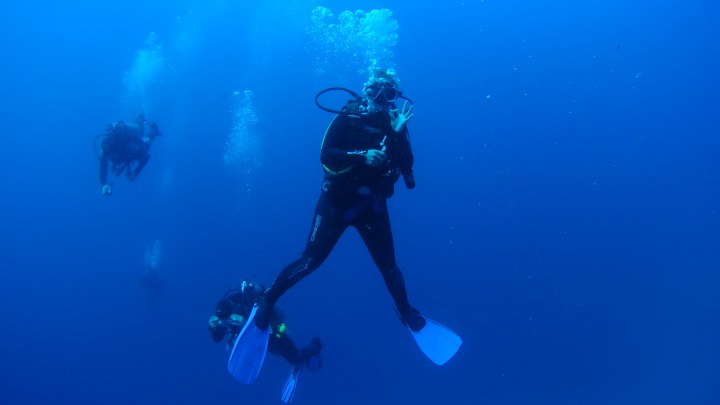by Guuske Tiktak, Manchester Metropolitan University
Having recently started my PhD at Manchester Metropolitan University (MMU) on the conservation management of elasmobranch (sharks, rays and skates) populations, I embarked on my first fieldwork season to Ecuador. Many people, including most of my friends, asked me if this involved swimming with sharks- and as glamorous as that sounded – their faces dropped when I inevitably told them that I went to fish markets in Ecuador to collect samples from dead sharks. Perhaps not as exciting as they had hoped. I had mixed feelings too, I was excited to be in a new country and be able to carry out my own research, but I was also nervous as my Spanish was pretty scratchy and I would have to come to terms with the fact that I would see many of my favourite animals being sold at these markets. There are many factors involved with carrying out fieldwork in another country, especially one that is almost 1000 km from your home and where your first language is not spoken. So here are some of the things that should be kept in mind when planning fieldwork abroad or when speaking to researchers in this field:
- No one tells you how much time you spend writing permits to collect samples (and even more time if you also have to write them in a different language). Some countries are easier than others and I was fortunate enough to already have had contacts in Ecuador. Permits take time, sometimes months, sometimes years and you have to be ready for delays. I applied for mine in January 2018 and received them just before I got to Ecuador in June 2018 which is really fast in the world of permits. Then you have transportation permits for moving samples from place to place, I had to apply for three of these. Then you need exportation permits out of the country and if you’re dealing with CITES (Convention on International Trade of Endangered Species of Wild Fauna and Flora) listed species, then you will need those export and import permits too. Lastly you will need a license to import biological samples into Europe (this was at least the case for the UK with DEFRA*).

- Collaborators/contacts. This is something that has been drilled into me from the start by my dad and, director of studies- ‘contacts, contact’s, contact’s’. This may be something that you have heard before and are probably sick of hearing, but it is so important. I could not have carried out my fieldwork without the contacts I had in Ecuador as well as new ones I made. Everywhere I go, whether it’s at conferences, at universities or even in the field, I try to meet as many people as I can and tell them about my research. I currently have contacts in West Africa, America, Mexico, the Bahamas, Colombia, Ecuador and of course the UK. My research would not be possible without these wonderful people!
- Being in the field is expensive. The flights, the food and accommodation are costly enough but then when you add in the cost of all the materials needed for sampling, it quickly brings the price up.
- Language. I already spoke some Spanish, so that really helped me when I was in Ecuador as many people did not speak English – especially at fish markets. I still struggled a lot and was lucky to have an Ecuadorian student assisting me with field collection as I would have struggled without his help.
- Lastly, I wanted to put in a little bit about how it actually feels to be out in the field. I love what I do, and I always try to be as professional as I can, but there were moments when I really struggled. I spent a month sampling in markets where most of the species caught were threatened. This was possibly the hardest part about being there as you are not able to put a stop to it, and I spent every day seeing my favourite animals being sold in high numbers. I had to keep thinking that I was doing my part and that there are people working towards a sustainable fishery.

The main aim of my field work was to collect as many tissue samples as possible for pollutant and genetic analysis. I also recorded how many elasmobranchs species were caught and which species. I measured the length of individuals and recorded their gender where possible. This was difficult sometimes as the fishers weren’t always happy when you started poking around their catches. A funny moment was when I spotted a bin with shark heads in it, and I seized that opportunity to collect a few more samples. Let’s just say, I smelled like daisies every day 😉
I didn’t experience very much fieldwork during my masters and bachelors, so this was a very new experience for me. With good planning and confidence, any researcher can go to the field and own it. Despite some of the challenges of being in the field, I got to experience the delicious food, culture and beautiful sites. Almuerzo – which are their lunch meals, are usually 2$ with a fresh juice, soup and main meal. Their juices are incredible, and there is a never-ending supply of fruit – benefits of the tropics. I learnt a lot about the Ecuadorian culture as well and made some good friends – which are also collaborators of my project.
I learnt so much by being in the field and look forward to going back. Now that I’ve experienced it before, it will be a lot easier. I will be in Colombia for my next field season and cannot wait.
*DEFRA = Department for Environmental, Food and Rural Affairs
About me
 My PhD research focuses on the conservation management of elasmobranch (sharks, rays and skates) populations in the wild and in captivity. As fishing of threatened shark species is an ongoing threat in many countries, part of my PhD research focusses on this trade of threatened species in Ecuador and Colombia. I will be using molecular techniques (microsatellites and mitochondrial CO1) to identify species sold in markets as well as genotype populations of sharks in the Pacific and Caribbean. My research will also look at pollutant concentrations in sharks as a health concern for shark populations as well as humans.
My PhD research focuses on the conservation management of elasmobranch (sharks, rays and skates) populations in the wild and in captivity. As fishing of threatened shark species is an ongoing threat in many countries, part of my PhD research focusses on this trade of threatened species in Ecuador and Colombia. I will be using molecular techniques (microsatellites and mitochondrial CO1) to identify species sold in markets as well as genotype populations of sharks in the Pacific and Caribbean. My research will also look at pollutant concentrations in sharks as a health concern for shark populations as well as humans.
I have been at Manchester Metropolitan University (MMU) for over 5 years now, completing both my bachelors (BSc) in Animal Behaviour and masters (MSc) in Conservation Biology here. During my masters I volunteered at Sea Life Trafford centre for over two years, which gave me the amazing opportunity to work with many different species of fish, sharks, rays, octopus and eels! This is what helped me get to where I am as well as having a passion for conserving the ocean. My love in the ocean started at a very young age, and I started scuba diving when I was only 11 years old! I am originally from the Netherlands, but I spent most of my life living abroad. I was born in Indonesia, moved to Hong Kong when I was two and then lived there for 12 years before moving to the Netherlands for four years. I hope to keep exploring the world and fight the battle against the trade of threatened species, specifically elasmobranchs.
- Website: https://www.ecologicalgenetics.org
- Twitter:@guusketiktak;@EcolGenLab
- Instagram: gtiktak (Guuske Tiktak)

